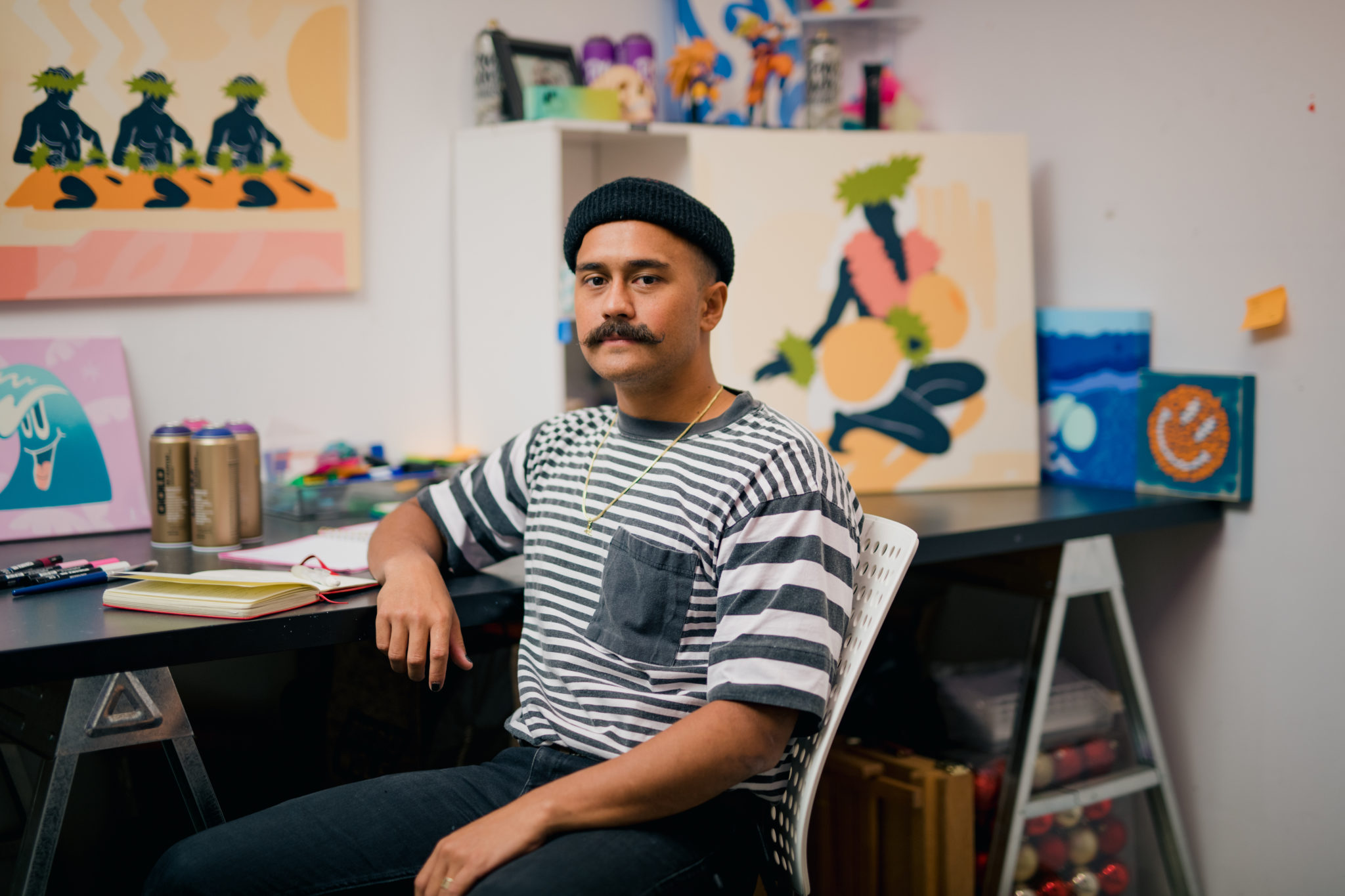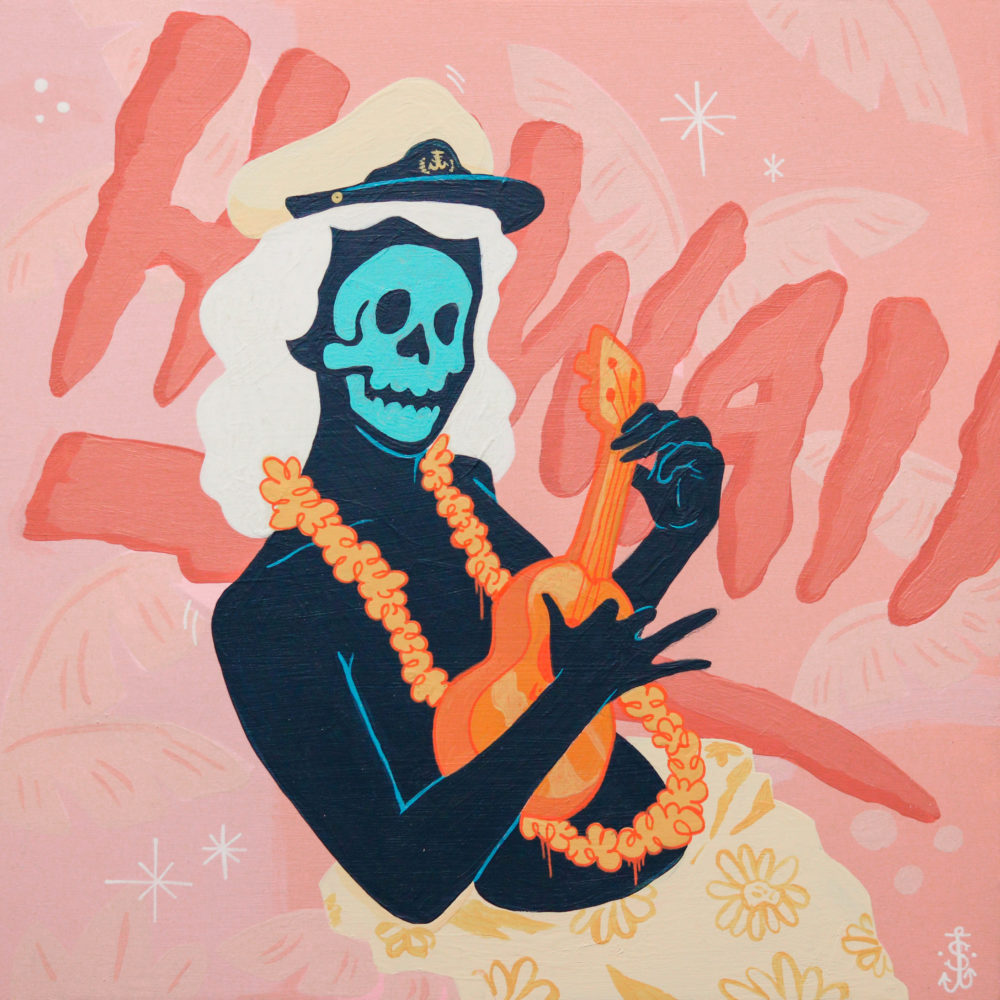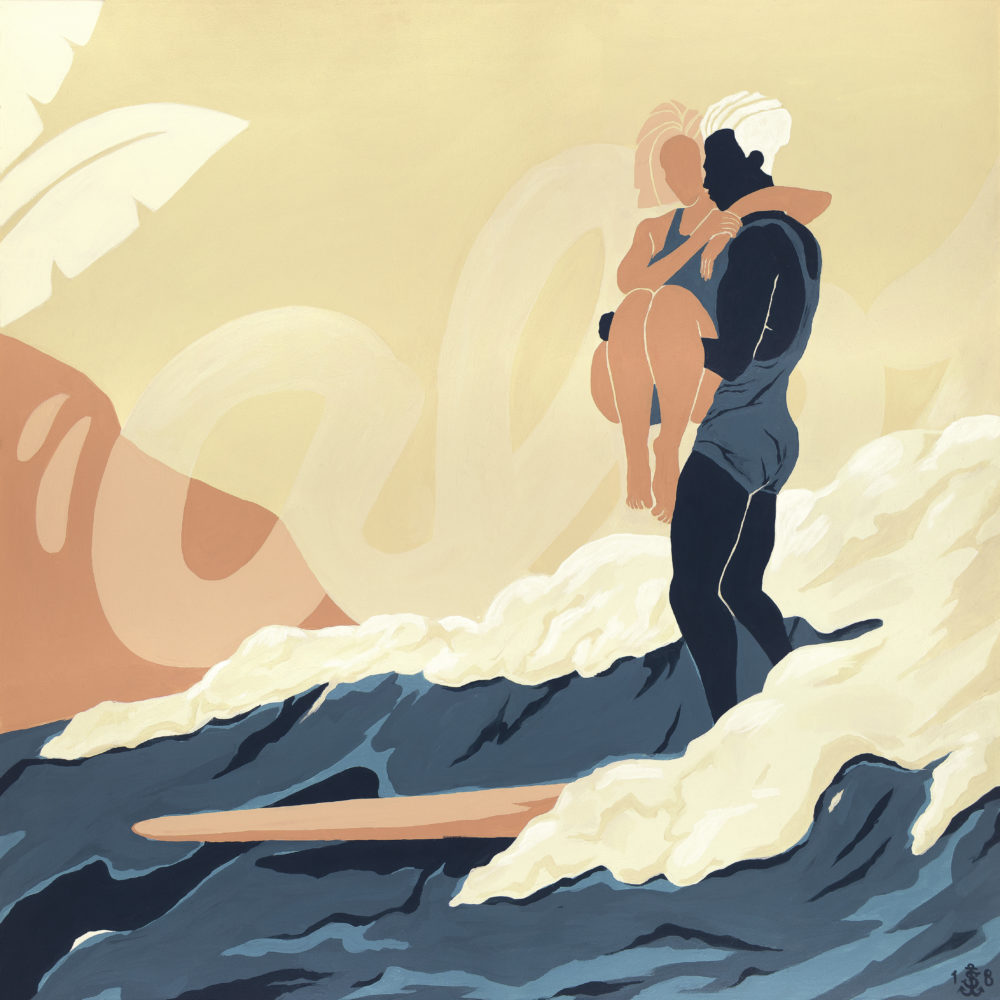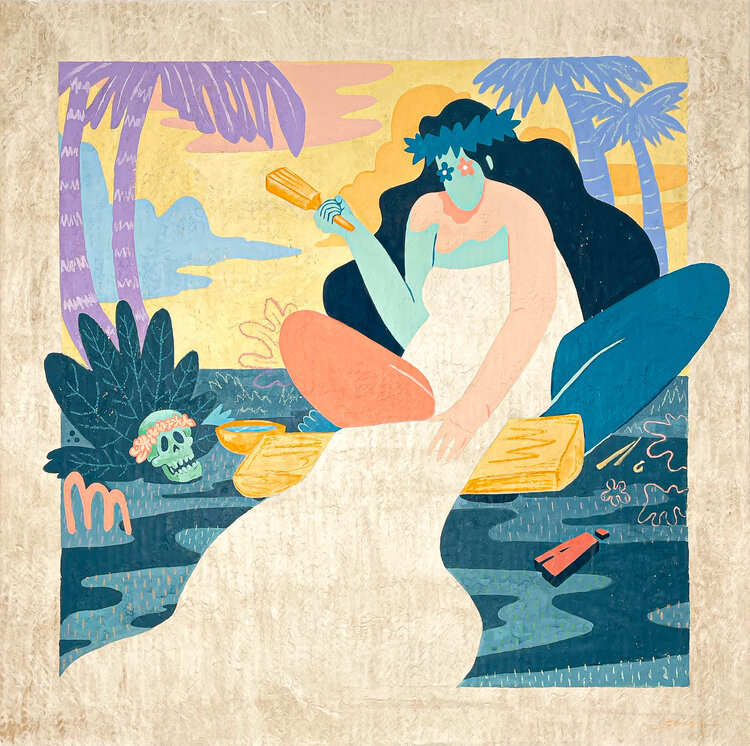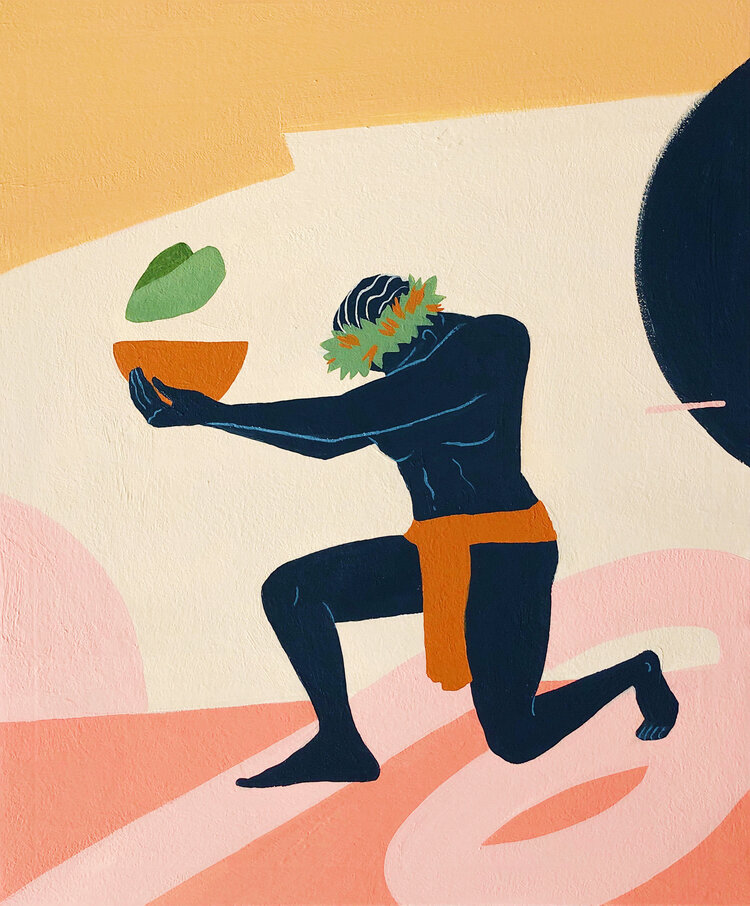Meet Jack Soren, the 26-year-old wave-surfing, graffiti-spraying, mural-painting artist inspired by where he was born, raised, and resides: O‘ahu’s North Shore, where culture and commerce collide daily.
Jack Soren is pensive. He thinks. Hard. When you speak to him, you can see the cogs turning in his head as he sorts out the answer to whatever you’ve just asked. He thinks intently about what is important to him: Surfing. Dirt biking. Art. Being Hawaiian.
As a child, Soren spent most of his time at the beach, due to his family’s deep connection to the ocean, particularly surfing. Then, as a teenager, he spent most of his time in ditches, spray painting its walls and falling in love with the painted figure. As an adult, Soren parlayed the lessons and techniques he learned in that guerilla classroom into a professional career creating diverse, multifaceted artworks.
Working primarily with paint, Soren’s work has been commissioned for major branding and marketing campaigns by the Vans Triple Crown and Hawaiian Airlines; he has also produced large-scale pieces for clients such as International Market Place and Bloomingdale’s, including a home mural for Bretman Rock. Given his expertise producing on a grand scale, Soren has been a featured muralist in art events around the globe, including Pow Wow Hawai‘i and SprayseeLA. Soren believes in sharing aspects of his Hawaiian culture with these outside audiences through his work. In 2021, at a mural festival in Washington D.C., Soren inscribed over his piece, “Ka lā hiki ola,” a phrase about optimism, hope, and looking toward the new day.
Being Hawaiian is very important. For Soren, working as a native artist in Hawai‘i is an incredibly complex position to be in, with many points to be considered, all of which surface in his paintings. There is responsibility, obligation, passion, and fulfillment in applying his lineage to the work that he creates. In reworking idyllic, postcard depictions of “vintage” Hawai‘i, he attempts — in some small part — to reclaim colonized imagery and make it his own, bringing it back into Hawaiian hands, denying the foreign commercialization of Hawai‘i, while retaining their depiction of Hawai‘i’s beauty and culture, with recognizable figures and a strong, smooth color palette.
Being the reflective, casually critical artist he is, we asked Soren about being a painter, a thinker, a doer, a studier, a designer, a surfer, a learner, as well as the self-work needed to learn about himself, his culture, his place, and making art that speaks.
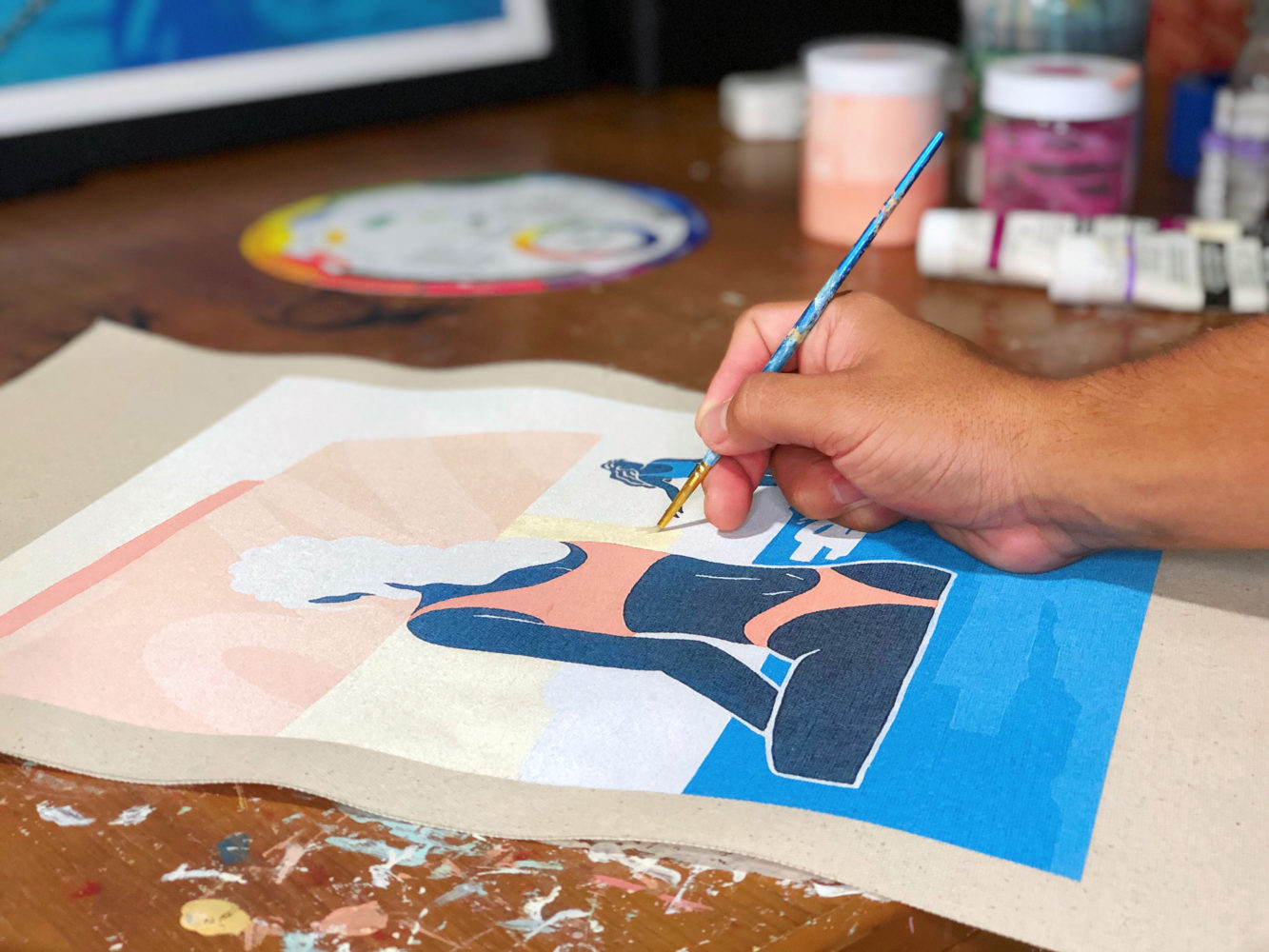

Nazareth Kawakami How exactly does one become a professional pretty-picture painter. Did you go to art school?
Jack Soren I graduated with a degree in graphic design from BYU and a minor in entrepreneurship. I think I’ve always known that I wanted to do art because we grew up painting graffiti, but there was never really a plan. Me and my friends would do murals for people every now and then, but not really canvasses. Canvas is a new thing for me.
NK Were you just tagging?
JS We would all do lettering, but I was always more drawn to characters and figures. It made it easy to transition from graf to legal murals because I was already used to painting figures on a large scale.
NK Why’d you stop?
JS Well, I got married. That’s something. I didn’t want her to have to come get me from a police station or whatever, but I wanted to keep making art, so I made this style as a test run and it took off. Now I make a living off of it.
NK Wait, what? This whole signature style was made on a whim?
JS I mean, I guess that’s one way to put it. I just have a lot of different tastes and preferences. My friends said to pick a style, paint five paintings, and see how that goes. I showed it to the Green Room Gallery, and it went from there. Now I’m trying to develop my style based on all of my preferred tastes. My colors are strong, I think. If I paint something in my color palette then my customer base seems to like it and it does well.
NK A serious question. Do you like your stuff?
JS That’s a good question. I ask myself that every day. I think I just get bored quickly. Getting stuck to surf paintings — I want to try different things already. I wanted to go paint a giant walrus in D.C., which I am lucky enough to do, and I appreciate that. I am lucky that I can produce what I want, and it’ll be appreciated by one audience or another. I’m less worried about what the market is going to do or what my audience will think.
NK You’ve built up a base?
JS Maybe just — I’ve built up my style and portfolio enough. I think in the beginning I was worried about whether things will sell or will people like this, but I don’t feel that pressure quite as much anymore. I think my style is also just very applicable to branding or apparel or whatever, and that’s given me a lot of great opportunities. I love what I do and I’m grateful that I get to make art for a living.
NK I might be reading into the language too much, but it sounds like you’re saying that your style is strong and you’re grateful for the opportunities and you love what you do. I asked you if you like your art, and your answer was that you love what you do, which is not really an answer. Maybe I’m overstepping.
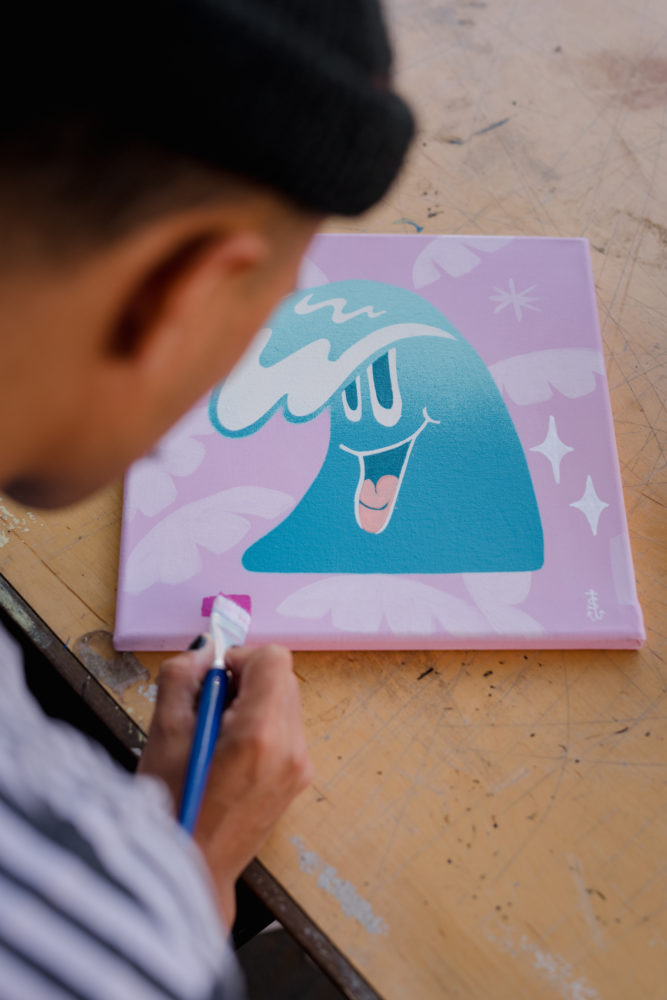

JS No, I’m interested in this rabbit hole. This is an interesting thought.
NK Well, I’ve seen your character graffiti style of art, and it’s so different from the stuff that you’re making commercially. Maybe you are putting that entrepreneurship degree to use and are putting forward what you think will sell best, and it’s working. But do you like what you’re selling?
JS Man, you really caught me in my words. I’m asking myself a lot of things, which is great! That has value to me. I’ve recently realized that as I talk to people who I admire or look up to for advice, my instinct is usually right, but my mind doubts it and complicates it, so I make the other decision sometimes. Or I’m procrastinating on those instinct decisions. A lot of the time I’ll ask an artist that I admire for advice and he will tell me the same thing that I thought was right a few weeks ago, but am doubtful of, or maybe scared of?
NK It seems like people who know you for your surfing art, don’t know you for your walrus art, and vice versa. Both of your styles are great, and I can see that they’re beginning to blend into each other a little more. I can see that Hawaiian-ness is important and incorporated.
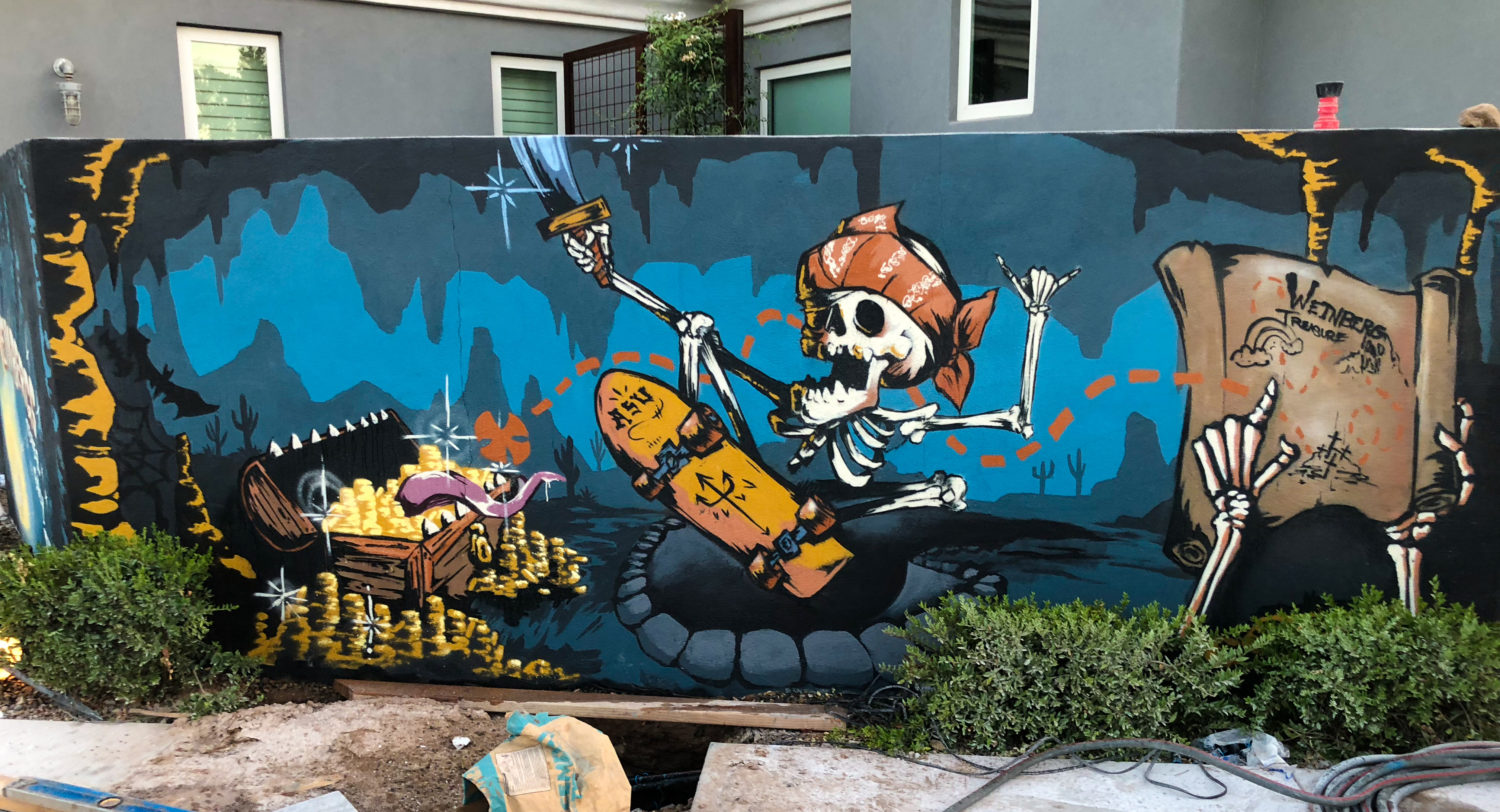

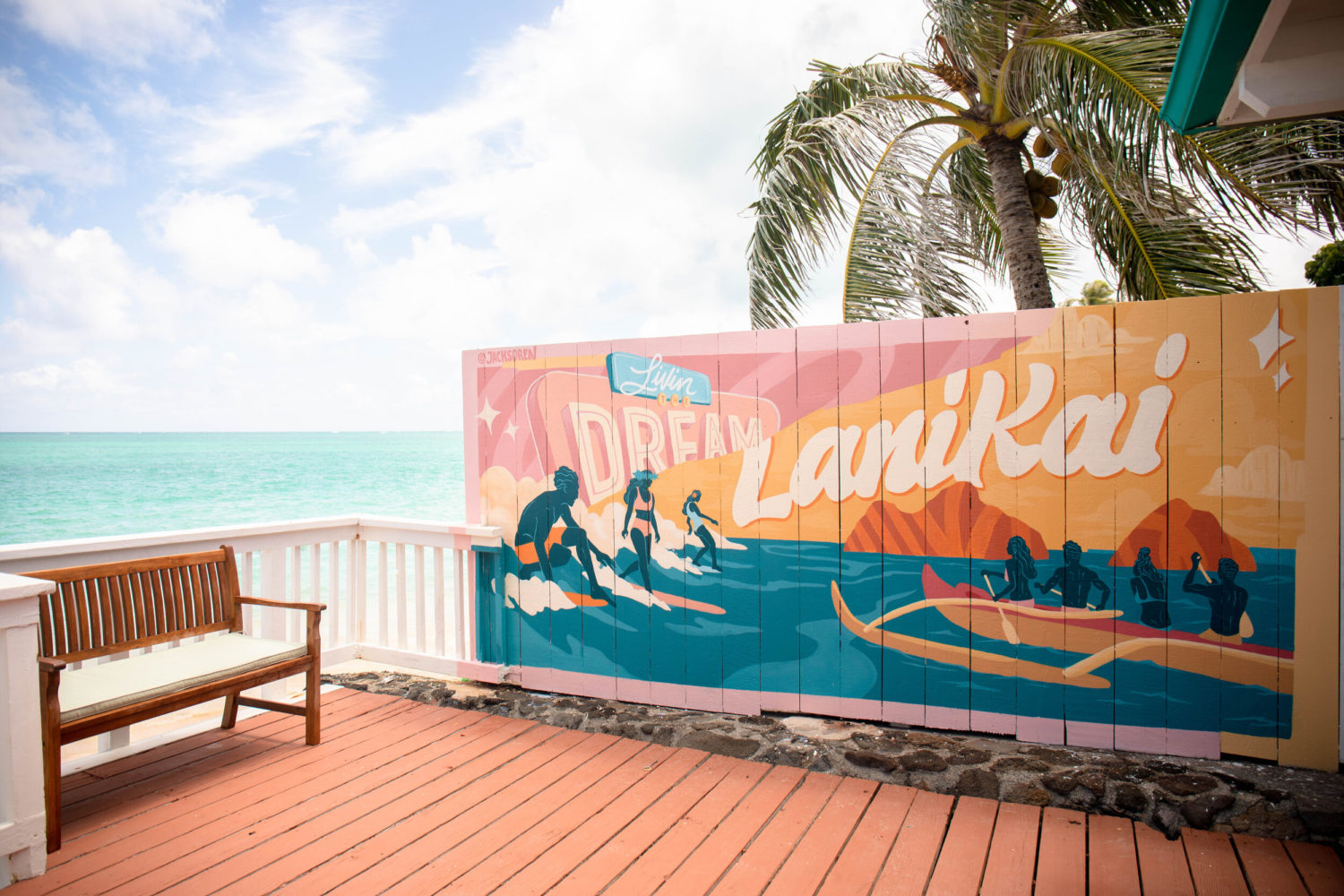

JS Is there a way to balance those two styles and combine them fully? Or do I need to make an alter ego. Do you know MF Doom? I love MF Doom. He has multiple albums under multiple egos and identities and he kills them all! I love that. It’s a whole personality and world that he’s building out over and over. I think, for me, the mountain of creating a whole other ego and running two businesses is so daunting that I don’t want to do that, so I’ve been trying to think about how to blend them.
NK What are your goals with the surf style? Not even professionally, necessarily. What do you get out of it?
JS I think it’s come from a younger dream to be a part of the surf industry because I was never good enough to go pro like my friends. I grew up on the North Shore and all my friends were sponsored and had all the cool shit sent to them, but I was never good enough for that. I think I found this other route to be a part of that industry. I did the Vans Sunset Pro contest and that was crazy! That was a dream come true. I didn’t get to compete, but I got to decorate the whole thing!
NK Decorate is an interesting word for that.
JS Well, my art is all over the scaffolding, the street, the apparel, it was great!
NK Yeah, decorating is just such a sweeter word. I expected a more corporate word, like branding.
JS Ah, yeah, maybe branding is more appropriate. But I made the event look beautiful. I don’t like the business words as much. I think as I get older, I’m realizing that I want to create artwork that’s more consistent. In graffiti, there are no narratives, really, we just paint whatever looks sick. As I get older, I think I want to think more conceptually without overthinking. That’s tough. I overthink.
NK It’s interesting that you’re an overthinker because I’d describe your art as modest. Not overly detailed, not complicated, very unified.
JS I think that sort of reflects my surfing — there aren’t a lot of surfers that I’ve painted who are ripping or surfing too aggressively. What I’d like in my surf paintings is to develop a softer palate, not so obnoxious, something more stylistic in my figures. That’s what I’ve been aiming for. I don’t want to be another Hale‘iwa surf artist. I don’t want to be grouped into these sunset-surfer paintings. That’s why I’m trying to develop more — combine my street style with my surf style to create something more interesting and obscure. I like this creative therapy that’s happening here. It’s fun to untangle all of this stuff out loud.
NK We’ve talked about how important Hawaiian culture and being Hawaiian is to you. Can you speak a little about that?
JS Yeah, it’s important to me. It’s mostly to do with learning and trying to incorporate lessons or values or really any sort of Hawaiian-ness into my daily life because I think that reconnection is really important as a Hawaiian person living in Hawai‘i in the modern day. I also want it to show through in my art. I’ll try and learn one new thing about kalo in order to have a better understanding of the image that I’m painting.
Growing up, I wanted to play Playstation and be really involved and assimilated with what Western culture had to offer, but now as an adult, I wish I had taken more of an interest in Hawaiian culture when I was young. I think that I’m seeing it get diluted and begin to recede, and that scares me, and I want to preserve it as best I can. Like, I’d love for my kids to go to Hawaiian immersion school and get them involved and interested at a younger age and sort of invest forward. Most of this just means doing a lot of research on my end and trying to know as much as I can, trying to understand and appreciate and have a deeper respect and appreciation for Hawaiian culture daily, but especially when I apply it to my artwork.
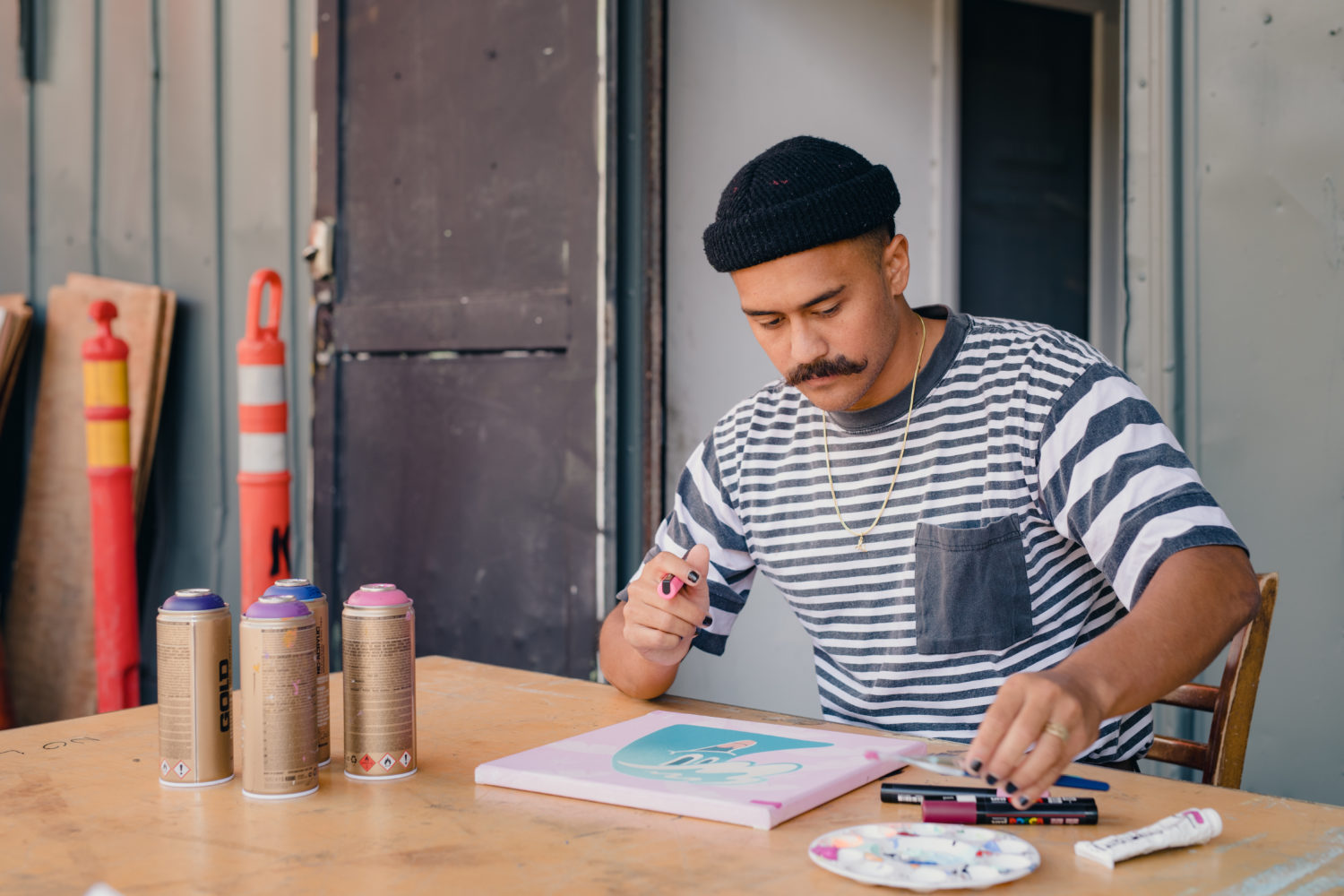

NK How do you reconcile that with your postcard-esque Hawai‘i subject matter? It can be seen as a sort of colonized imagery.
JS Yeah, I can see that. I took this nostalgic look and reimagined it in a more modern way. Deep down, there is a lot of contradiction. All those postcards, I like the style and the nostalgia, but I wasn’t thinking about the impact of those things on Hawaiian culture at that time, because those are the postcards that sold Hawai‘i. It’s difficult because it’s the style that I like, and I put a lot of my own thought and research, my own self into the subject matter of what I’m painting, but it is referencing this sort of imagery that was detrimental to Hawaiian culture.
What I’d like in my surf paintings is to develop a softer palate, not so obnoxious, something more stylistic in my figures. I don’t want to be another Hale‘iwa surf artist. I don’t want to be grouped into these sunset-surfer paintings.
Jack Soren, artist
NK You’re a Hawaiian artist painting Hawai‘i. Maybe this is a reclamation of that imagery?
JS It’s really complicated. I mean, if I’m being honest, I’m an overthinker, but maybe I should be thinking this hard about these things, and I do. I think so much about this contradiction and what things mean and my impact and what my art is saying or doing and how I relate to it and the world that I live in. I’m trying to find it still. I’m trying to find answers and understanding about what I’m doing. I don’t really know yet, and that’s fine, I’m okay with that. I am working toward understanding. I’m trying to be patient and do work and do research and trying really hard, and I know that this is a long game.
NK I think a lot of artists these days — well, people in any creative field — have a hard time admitting that they aren’t correct or knowing, or sort of without any contradiction at all times. It’s hard for people to not instinctually go, “Well actually I’m right because of this” or “Yes I already knew that.”
JS Have you read The Four Agreements? You should. It’s a really good book. It taught me to be okay with myself and okay with being on the journey as long as you’re really working at it. I always ask people what they think about what I’m doing or what I’m making and I think it’s a very nice thing to do, but the only answers I ever get are, “Oh you’re doing great!” It’s nice to have someone be real with me and bold enough to ask me about these contradictions because this is the stuff I think about already, and I think there needs to be more discussion and criticism.
NK I’m pretty good at criticizing.
JS I mean productive criticism.
This interview has been edited by length and clarity.

